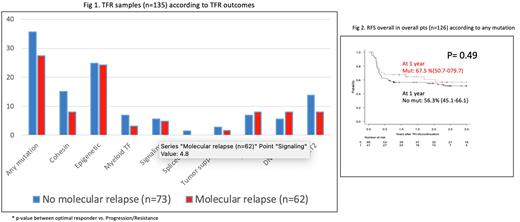Abstract
Treatment-free remission (TFR) has been accepted as a practical treatment goal in chronic myeloid leukemia (CML) patients. TFR is defined as successful discontinuation (DISC) of Tyrosine Kinase Inhibitor (TKI) therapy without losing leukemia control. Multiple clinical studies have reproduced a consistent TFR rate of about 50%. No definite biomarker has been identified or validated yet. Adnan et al (BCJ 2022) recently reported that epigenetic modifier gene mutations at initial diagnosis of CML are associated with TFR success after TKI DISC. The issue is the time gap between mutation profiling at initial diagnosis of CML and the clinical event of a TFR attempt, which is about 5-10 years. Mutation profiles in the samples obtained before TKI DISC have never been investigated as a TFR predictive marker. Next-generation sequencing (NGS) has been incorporated into clinical practice. Conventional targeted sequencing techniques have limitations such as the high error rate, its limit of detection is up to 2-5%. Mutation frequency and allele frequency (AF) were assumed to be very low in the patients who achieved deep molecular response. Thus, conventional NGS likely misses mutations with low AF. Single-molecule molecular inversion probe (smMIP) is a bar-coded, error-corrected NGS approach, can overcome the high error rate issue by tracking all sequence reads derived from a single strand. This study aims to detect somatic mutations using a smMIP panel to evaluate if the mutations assessed can be a biomarkers for TFR failure.
Patients and Methods
We applied our in-house CML-specific smMIP panel with a limit of detection up to 0.2%. The panel encompasses 37 genes with 332 amplicon probes: epigenetic modifiers (n=7), activation signaling (n=12), myeloid transcription factor (TF; n=5), spliceosome (n=3), tumor suppressor (n=3), cohesion (n=4) and miscellaneous (n=3). Our cohort included 135 patients who attempted TKI DISC for TFR from 4 countries: Argentina (n=28, 20.7%), Brazil (n=30, 22.2%), Czechia (n=3, 2.2%), Canada (n=34, 54.8%). Disease characteristics and outcomes were evaluated and compared according to the mutation profiles prior to TKI DISC. Molecular relapse-free survival (RFS) was calculated from the date of TKI DISC to the date of confirmed loss of molecular response. An episode of major molecular response (MMR) loss or two consecutive episodes of molecular response loss of 4 logs or deeper response (MR4) constituted molecular relapse. Kaplan-Meier survival estimate was used to evaluate RFS and Cox's proportional hazard regression model was applied.
Results
Median age was 55.5 years (25-72), 55% males, and Sokal Score risks rates were as follows: Low 51.8%, intermediate 26.8%, High 8.33%. All patients were in chronic phase at diagnosis. A total of 102 pts (78%) stopped Imatinib, while 24 pts (22%) stopped 2GTKI: Dasatinib (n=17) and Nilotinib (n=7). There was no difference in RFS between IM DISC vs. 2GTKI DISC: the patients who stopped IM showed RFS rate of 64.3% (40.9-80.4%) vs those who stopped 2GTKI showed 58% (48.5-67.7%; p=0.634). A total of 59 mutations were detected in 43 (31.9%) patients. TET2 was the most commonly mutated gene (n=15, 11.1%) followed by ASXL1 (n=10, 7.4%) and, DNMT3A (n=9, 6.7%). According to its biologic pathways of the mutation, mutations were detected in the Epigenetic modifiers (n=33, 56%) most frequently, followed by Cohesin (n=16, 27%), activated signaling (n=7, 12%), tumor suppressor (n=3, 5%) and splicing (n=1, 2%). According to the mutational profile before TKI DISC for the TFR attempt, no difference in RFS was observed according to the biological pathways of mutations or according to the presence of mutation (fig 1). Overall RFS at 1 year was 56% (95% CI [45.1-66.1%]) in patients without any mutations comparing to 67.5% (50.7-79.7%) in patients with mutation(s) (p=0.49; fig 2). The RFS rate at 1 year was 58.9% (48.3-68%) in patients with epigenetic mutations compared to 63.3% (43.6.-78.7%) in those without it (p=0.73). Even after adjustment for MR4 duration, we could not identify any predictive profile of RFS.
Conclusion
Somatic mutations were not infrequently detected in the patients qualified for TFR attempt using a technique detecting up to 0.2% VAF. Mutations in epigenetic genes were most frequently detected. However, it does not seem to have any predictive power for TFR success. Its biological relevance remains to be further investigated in future research.
Disclosures
Perusini:Pfizer: Consultancy. Pagnano:Wieth/Pfizer: Consultancy, Honoraria; GSK: Consultancy; Novartis: Consultancy, Honoraria; Astellas: Consultancy, Honoraria. Pavlovsky:Novartis, Pfizer, BMS, Pint Pharma: Speakers Bureau; Novartis, Pfizer: Membership on an entity's Board of Directors or advisory committees. Moiraghi:Takeda: Speakers Bureau; Pfizer: Speakers Bureau; Novartis: Speakers Bureau. Žácková:Angelini Pharma: Consultancy, Speakers Bureau; Novartis: Consultancy, Speakers Bureau. Kim:Novartis: Consultancy, Honoraria, Research Funding; BMS: Research Funding; Pfizer: Consultancy, Honoraria, Research Funding; Paladin: Consultancy, Research Funding; Merck: Consultancy; Sanofi: Consultancy, Honoraria.
Author notes
Asterisk with author names denotes non-ASH members.


This feature is available to Subscribers Only
Sign In or Create an Account Close Modal